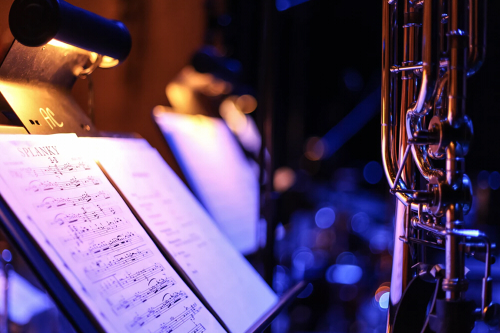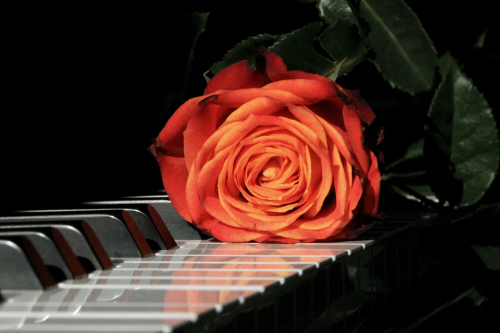Brains of Jazz and Classical Musicians Work Differently
脑子不一样的音乐家:爵士VS古典
译/曹艳丽
A study published by the Max Planck Institute for Human Cognitive and Brain Sciences (MPIHCBS) found that musicians who work in the two fields demonstrate substantially different brain activity, even when they’re playing the same music.
根据马克斯·普朗克人类认知与脑科学研究所发表的一项研究报告,爵士和古典这两个领域的音乐家,即使演奏同一首曲子,大脑活动也显示出很大不同。
The research could help explain why musicians seem to excel in one or other style, and not usually in both.
这项研究可能有助于解释为什么音乐家似乎擅长这一种或那一种风格,而一般不会两种都擅长。
The study outlines two steps in playing the piano: what the pianist is going to play – meaning the keys they press – and how they are going to play – which fingers they should use.
该研究涉及到钢琴弹奏的两个步骤:钢琴家要弹什么,即他们按下哪个琴键;以及怎么弹,即他们使用哪根手指。
Classical pianists tend to focus on the second step – the ‘how’. This means their focus is on technique and the personal expression they add to the piece.
古典乐钢琴家倾向于关注第二步“怎么弹”,意味着他们的焦点在于技法和所赋予曲目的个人表达。
Jazz pianists on the other hand focus on the ‘what’, meaning they are always prepared to improvise and adapt the notes they’re playing.
另一方面,爵士乐钢琴家关注的是“弹什么”,意味着他们常常准备即兴发挥和改编正在演奏的曲子。

The study included 30 professional pianists, half of whom were jazz players and half of whom were classical.
这项研究的对象是30名职业钢琴家,爵士乐演奏家和古典乐演奏家各占一半。
Both groups were shown a hand playing a sequence of chords on a screen. The sequence was scattered with mistakes in harmonies and fingering. The pianists had to imitate the hand movements and react to the irregularities, while their brain signals were recorded with sensors on their head.
研究人员在屏幕上为两组钢琴家展示正在弹奏一串和弦的一只手。这串和弦弹奏时夹杂着和声和指法错误。钢琴家们必须模仿手的动作,并对错误部分做出反应,与此同时,他们头上的传感器记录下了他们的大脑信号。
The study found that different processes occurred in the brains of the jazz and classical pianists. In particular, the jazz pianists’ brains began re-planning sooner than the classical pianists’ brains.
研究发现,爵士乐和古典乐钢琴家的大脑中出现了不同的处理过程。尤其是,爵士乐钢琴家的大脑比古典乐钢琴家的大脑更快开始重新设计。

The study found the classical pianists concentrated on the fingering and technique of their playing, while the jazz pianists were more prepared to change the notes they played to improvise and adapt their playing to create unexpected harmonies.
研究还发现,古典乐钢琴家弹奏时专注于指法和技巧,爵士乐钢琴家则更愿意改变演奏的音符来即兴创作,并通过改编来创造意想不到的和声。
“In the jazz pianists we found neural evidence for this flexibility in planning harmonies when playing the piano,” says researcher Roberta Bianco.
研究人员罗伯塔·比安科说:“关于边弹奏钢琴边设计和声的这种灵活性,我们在爵士乐钢琴家身上找到了神经学证据。”
“When we asked them to play a harmonically unexpected chord within a standard chord progression, their brains started to re-plan the actions faster than classical pianists. Accordingly, they were better able to react and continue their performance.”
“当我们要求他们在弹奏标准和弦的过程中加入一个意想不到但不违和的和弦时,相比古典乐钢琴家,爵士乐钢琴家的大脑更快开始重新规划动作。因此,他们能够更好地作出反应、继续演奏。”
However, the classical pianists performed better than the jazz group when it came to following unusual fingering. Their brains showed more awareness of the fingering, and as a result they made fewer errors while playing.
然而,古典乐钢琴家在遵从不寻常的指法方面比爵士乐钢琴家表现得更好。他们的大脑更注意指法,因此演奏时更少犯错。
The researchers concluded that switching between jazz and classical styles of music can be a challenge, even for musicians with decades of experience.
研究人员得出结论,即使对有几十年弹奏经验的音乐家来说,在爵士乐和古典乐风格之间转换可能也是一个挑战。
They quoted jazz pianist Keith Jarrett, who was once asked in an interview whether he’d like to do a concert where he would play both jazz and classical music: “No, that’s hilarious,” he said. “It’s [because of] the circuitry. Your system demands different circuitry for either of those two things.”
他们引用了爵士乐钢琴家基思·贾勒特的一段话。在一次采访中,贾勒特被问及是否愿意举办一场爵士乐加古典乐的演奏会,他回答道:“不,那太滑稽了。(因为)这是脑回路的问题。大脑需要不同的回路来处理这两样东西。”








